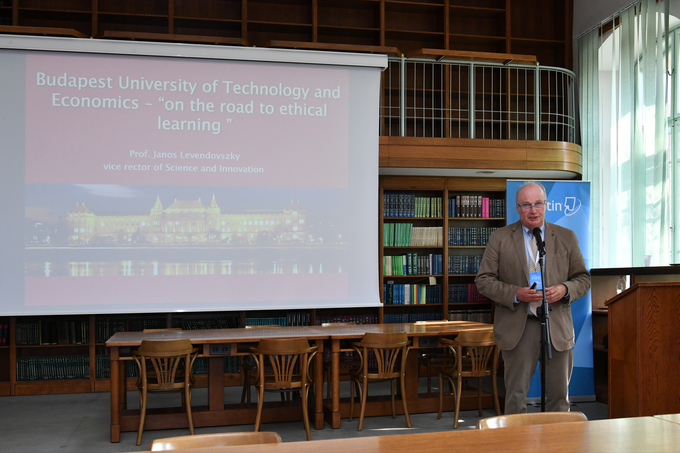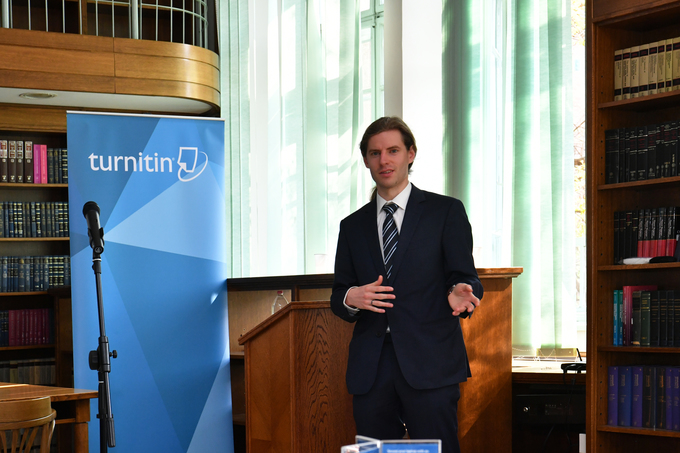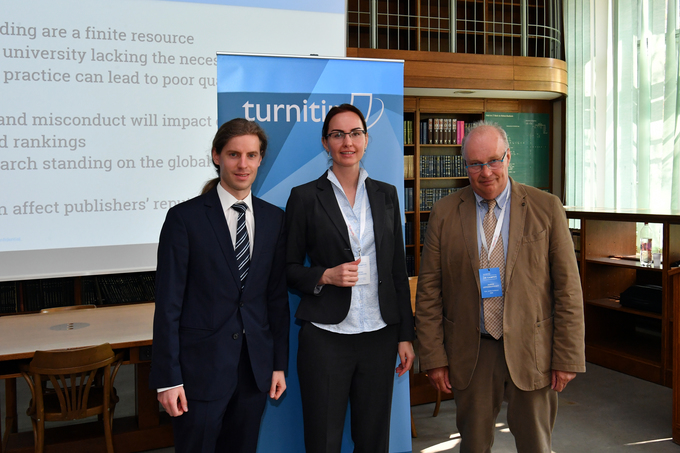News feed
„BME’s new anti-plagiarism software to increase publication potential”
2019. 05. 06.Higher education experts from BME and other Hungarian institutions learn about the Turnitin software package.
“Since its foundation Budapest University of Technology and Economics has been committed to outstanding performance both in research and teaching: the key to quality is in our history, the strong research potential of our faculties, the excellent scientometric characteristics and the achievements of our great researchers. At the same time excellence also requires ethical behaviour or, as it is referred to nowadays, ethical learning and ethical research”, said János Levendovszky, Deputy Dean of Scientific and International Affairs when addressing the participants of the „Turnitin On-Campus event in Budapest”, organised by BME, with the help of BME OMIKK, and the developer of the Turnitin anti-plagiarism software to showcase ethical learning and publication. The professor stressed to the organisers, the academic staff of BME’s faculties and the representatives of other universities from Budapest and elsewhere in Hungary that one of the university’s fundamental tasks is to safeguard ethical behaviour and fight plagiarism, because this phenomenon may decrease the value of diplomas in the long term. He added that the priority objective was to operate “ethical universities”, based on the authors’ ethical behaviour.

In her presentation, Iryna Krejcarova, Turnitin’s regional manager demonstrated the features of the software, adding that the current market-leader framework system was developed in 1998 by two students. She stressed that academic integrity and ethical behaviour had become a global issue. What’s more, they have become one of the key indicators of the standard of scientific work, which means that there is an increased demand for anti-plagiarism solutions among lecturers, researchers, publishers, project financiers and government bodies. This product is especially useful in a higher education environment; the programme is already available in several Hungarian universities.

She added: the company has 16,000 universities globally among its partners: 75 of the top 100 institutions use this framework system. Within its plagiarism checker function the database goes through around 1 million student projects, 170 million scientific publications and approximately 64 million websites to look for similarities in the texts. Another advantage is that it can be integrated into the top 5 electronic learning management systems (Moodle, Blackboard, Brightspace, Canvas and ManageBac). It is also capable of filtering deliberate plagiarism, accidental similarities or inaccurate references, thus helping students and researchers improve their publication skills.

“There is no exact definition for scientific excellence, but we ‘instinctively feel’ what it is and ethical publishing is definitely part of it, stressed Viktor Józsa, assistant professor of the Department of Energy Engineering at BME’s Faculty of Mechanical Engineering (GPK) in his presentation, while also describing the challenges of scientific transparency, modern engineering research and education. Finally he summarised the results of the test phase for the BME staff. He also demonstrated the software’s reporting function and the correct evaluation of the reports by using an article sent for publication in a Q1 journal.

“Recently I received several copied reports and other works from students who attended Hungarian and international courses, said Viktor Józsa to bme.hu when talking about the importance of the subject. He is also the chairman of the IT Committee at the Faculty of Mechanical Engineering and he explained that foreign academics working at the university were also interested in using the software for checking review articles, so the faculty management asked the committee to find a suitable anti-plagiarism product. “The ethical use of intellectual property not only applies locally, that is for the students of a given course, but it is thought to be a global issue; it may influence the standard of international publications, the works of PhD students and their future scientific careers, so we needed a comprehensive solution”, explained the young assistant professor.
By analysing the needs for an anti-plagiarism product, which included the comparison of the work of students within the same subject, checking individual assignments, theses and draft degree theses, especially when these have been archived electronically, and promoting the publication activities of doctoral students and researchers, it was discovered that there was no such sophisticated software available free of charge that would meet all these requirements. “The only solution was the Turnitin framework system, which is available for a subscription fee and is suitable from all aspects, for example it is GDPR compatible, and it has a search function in and access to all the publications of every important publisher”, stressed GPK’s assistant professor, adding that there are plans for the integration of the Hungarian PhD database.
Viktor Józsa added that Periodica Polytechnica, BME’s scientific journal already had access to Turnitin. “Based on these experiences, we decided firstly to organise an event to present the features of the software at Budapest University of Technology and Economics, and then with the help of OMIKK we invited experts from the whole of Hungary to showcase the product”, he explained.
According to the plans, the system will be available for all academic staff and for about 800 PhD students at BME in the 2019-2020 academic year. Based on experiences its use may be rolled out to students who are in their final year in international academic programmes. The software, which is planned to be subscribed to, is also a great help in increasing the effectiveness of supervision in doctoral programmes. The academic package includes unlimited checks, unlike the access provided for journals, such as Periodica Polytechnica, where there is an extra fee per document on top of the basic subscription fee. The long-term plan is to make Turnitin available for every BSc and MSc student in their final year from 2023.
“It is very difficult to directly measure or quantify in Forints the benefits of this anti-plagiarism software, developed to filter textual information. In the long term, however, its use can increase our publication potential, the standard of our students’ work and also strengthen mutual trust, which is very likely to result in BME’s better ranking internationally”, summarised Viktor Józsa.

HA-GI
Photo: János Philip
